

 |
 |
|
 |
|
| About Us |
|
Read Past Issues | Resources | Composer Links |
When Bernstein was only 25, he held his first conducting post as Assistant Conductor of the New York Philharmonic. It was in this capacity that, on November 14, 1943, he made his historic conducting debut. With only a few hours notice, he substituted for the ailing Bruno Walter at a Carnegie Hall concert. Overnight he became famous. The performance was broadcast nationwide on CBS radio and the next day made the front-page of the New York Times. This acclaim quickly led to invitations to conduct orchestras all over the world. Although
he wrote three major symphonies, Bernstein never attained the "serious
composer" accolades he longed for in his lifetime at least partly because
he was so eclectic and his work embraced so many genres and styles. His
works successfully bridge the divide between
He composed sonatas, symphonies, film, religious choral works, ballets, song cycles and, most memorable in the public's mind, Broadway musicals, including On the Town, Candide and one of the greatest ever created--West Side Story. That work alone would ensure Bernstein's reputation as a composer, but while that one work has become familiar to virtually everyone, his symphonic music is nowhere near as well known. His
Symphony No. 1 ("Jeremiah"); No. 2 ("The Age of Anxiety") and No. 3 ("Kaddish")
are rarely heard in concert these days. Christopher Eschenbach
and the Chicago Symphony are playing all three as part of the Ravinia
Festival this summer.
|
|
An Interview with Tobias Picker Handmaid Tale's Debuts in English Rautavaara Joins B&G Who's Afraid of Julia Wolfe Derek Bermel's Soul Garden The Pianist: The Extraordinary True Story of Wladyslaw Szpilman John Adams' Atomic Opera A Bridge Not Far Enough Turnage Signs With B&H Sophie's Wrong Choice Copland's Mexico On Being Arvo Rzewski Plays Rzewski Praising Lee Hyla David Lang's Passing Measures Three Tales at BAM Naxos at 15 On the Transmigration of Souls Dead Man Walking David Krakauer's The Year After Steve Reich/Alan Pierson
|

Music of Elliott Carter Volume Five - Nine Compositions (1994-2002) Composer: Elliott Carter Performer: Rosen, Sherry, et al. Label: Bridge Volume Five of Bridge’s indispensible ongoing Elliott Carter series contains five premiere recordings, including Carter’s Oboe Quartet of 2001. Now well into his tenth decade, Carter's imagination is undiminished by the passing of time. Also featured on this CD is a new recording of Carter’s song cycle Of Challenge and of Love, performed by the brilliant young American soprano Tony Arnold, the recent first prize winner of the Gaudeamus International competition for interpreters of contemporary music. Rounding out this CD are a series of instrumental miniatures played by dedicatees Virgil Blackwell, Charles Neidich, Ayako Oshima and Fred Sherry. In addition, the pianist Charles Rosen adds on to his earlier (almost) "Complete Piano Music of Carter" CD (BRIDGE 9090) with the Two Diversions, and Retrouvailles. |

Concertos Composer: Pascal Dusapin Performers: Watt - concerto pour trombone et orchestre - 1994 Galim - concerto pour flûte solo et orchestre à cordes - 1998 Celo - concerto pour violoncelle et orchestre - 1996 Disques Montaigne Dusapin's
early influences were Xenakis and Franco Donatoni but his receptivity to
other artistic media, like jazz, graphic arts, or poetry, provide his work
with texture and ambiquity and give Dusapin a unique modern voice all his
own. These first recordings of his concertos for trombone,
flute and cello all benefit from committed performances and vivid recordings.
|

Rituel in memoriam Bruno Maderna Notations 1, 7, 4, 3, 2 figures-doubles-prismes Composer: Pierre Boulez Orchestre National de Lyon David Robertson Disques Montaigne Boulez's tribute to the late conductor/composer Bruno Maderna is an extremely moving dance of small ensembles arranged around a fixed point. All five completed of the 12 projected Notations, the most protracted of all Boulez's works in progress, heard here. What began as a collection of piano miniatures in 1945 has been expanded into a series of orchestral studies over the past 20 years; the most recent, Notation VII, appeared in 1998. Most rewarding of all is Figures - Doubles - Prismes, Boulez's landmark 1960s piece which marked the first time he had composed for a full orchestra alone. For mainly practical reasons, it is one of the least often performed of Boulez's masterpieces. David Robertson demonstrates persuasively why he is the conductor of the moment. |

Symphony No. 2 "Age of Anxiety" Composer: Leonard Bernstein Performer(s): Jean Louis Steuerman, piano, Florida Philharmonic Orchestra, James Judd Age
of Anxiety is one of Bernstein's most personal works, first performed in
1949 with Bernstein playing the piano part himself, this CD also includes
the Symphonic Dances from 'West Side Story' and the overture to 'Candide.'
|

Sonic Vision Composer: Carolyn Yarnell Tzadik Inspired by the beauty and power of nature, the music of Carolyn Yarnell straddles the borders of minimalism, romanticism and Baroque. Sonic Vision, the first CD devoted entirely to her music, contains the powerful electronic composition Love God, a beautiful solo piece for Baroque flute, a minimalist suite for chamber ensemble and a powerful extended work for computer piano. Lyrical and mystical music that evokes volcanoes, birds and the Rocky Mountains. |

Chamber Music Composer; Harold Shapero Performers: Lydian String Quartet New World Records - Shapero’s (b. 1920) vastly underrated portfolio is one of the great undiscovered treasure troves of American neoclassicism. The String Trio, the String Quartet, the Serenade in D offer a broad-based introduction to Shapero’s compositional thought processes. Beautiful, committed playing by the Lydian String Quartet. |

Drumming Composer: Steve Reich Performer: Ictus, Synergy Vocals Cypres Reich's 1971 masterpiece gets a spirited workout by the Belgian new music group Ictus. Drumming is constructed around one single basic rhythmic-melodic pattern, for an imposing ensemble of percussion (bongos, marimbas, glockenspiel) joined by some female voices, a piccolo flute or a whistling part. The breathtaking feeling of simplicity/complexity in this work is transmitted with an amazing skill by the Belgians. |

American Works for Piano Duo Composer(s): Barber, Persichetti, Diamond, Fennimore Performer (s): Georgia & Louis Mangos Cedille Records Barber's homage to the Plaza Hotel's Palm Court, Souvenirs, Op. 28, has never sounded better or more nostalgic and Joseph Fennimore's Crystal Stairs also invokes the quintessential American city. The real surprise here are the two pieces by Vincent Persichetti, which invoke a more dynamic and rough and tumble form of Americanism. The Mango sisters display formidable technique and taste.
|
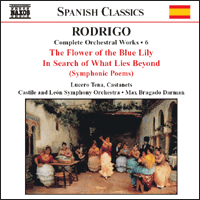
Orchestral Works 6 Composer: Joaquin Rodrigo Conductor: Max Bragado-Darman Performer: Lucero Tena Naxos For a guy who is basically famous for a single work, Rodrigo sure wrote a lot of sparkling, sunny, highly-listenable music. Not sure how many more of these Naxos has in the works but I'm not tired yet. |
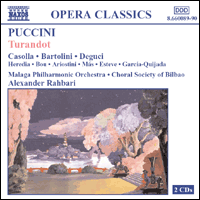
Turandot Composer: Giacomo Puccini Conductor: Alexander Rahbari Performer: Masako Deguci, Jose A. Garcia-Quijada, et al. Naxos Like a local wine consumed with good friends and good food not far from the vineyard, regional opera productions of famous operas often have a charm, passion, and character that befies their modest ambitions. This thoroughly charming rendering of Puccini's most hummable score is one of those unexpected delights. |
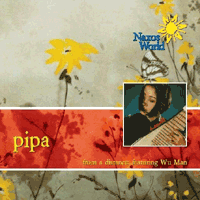
Pipa From a Distance Performer: Wu Man, Stewart Dempster, Abel Domingues Naxos In addition to being a rightous goodlooking babe, Wu Man is probably the best pipa player alive and here she takes on some thoroughly modern pieces with results that range from the soothing to the downright eerie. There are echos of Yo Yo Ma's Silk Road Project (for which Wu Man served as main pipa person) as well as hints of new traditions yet to come. |
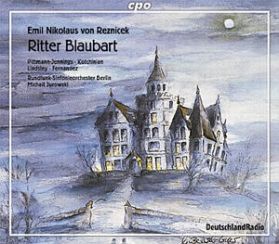
Ritter Blaubart Composer: Emil Nikolaus von Reznicek Conductor: Michail Jurowski Performer: Arutiun Kotchinian, Robert Worle, et al. Cpo Records Emil Nikolaus von Reznicek (1860-1945) is remembered for a single work, the overture to the opera Donna Diana but CPO hopes to change that with the release of his Ritter Blaubart (Knight Bluebeard), a fairy-tale opera. Gretry, Offenbach and Bartok were also drawn to the story of Bluebeard, the mythical figure who kills his faithless wife and then murders the other women he marries. Reznicek's version boasts music filled with atmosphere and keen drama. Conductor Michail Jurowski leads the Berlin Radio Orchestra and a cast of fine singers in a powerful performance. |

The Shock of the Old Composer: Common Sense Composers' Collective Santa Fe New Music - #513 Consider the possibility that ancient instruments like the harpsichord, Baroque flute and so on can be used to play contemporary music as well and you have the idea behind this very fresh and appealing collaboration between the Common Sense Composers' Collective--an eight-member cooperative based in New York and San Francisco--and American Baroque, an early-music consort that makes its home in the Bay Area. Remarkable stuff that should make converts on both ends of the musical spectrum. |
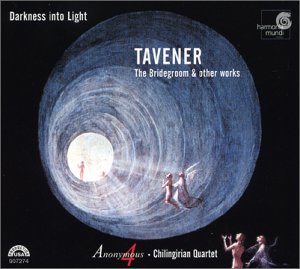
Darkness into Light Composer: Composer: John Tavener Performer: Anonymous 4 Harmonia Mundi Franc Four pieces by contemporary mystic composer John Tavener framed by medieval hymns illustrate the passage from darkness to light in this hypnotic collaboration between Anonymous 4 and the Chilingirian Quartet. The most substantial piece is the world premiere of Tavener's "The Bridgegroom," which is nearly 18 minutes long and spellbinding from start to finish.
|
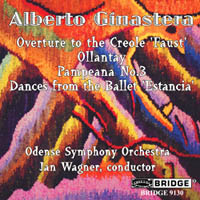
Overture to the Creole 'Faust' Ollantay, Pampeana No. 3 Dances from the Ballet, 'Estancia' Composer: Alberto Ginastera Performers: Odense Symphony Orchestra, Jan Wagner, conductor BRIDGE 9130 The nice folks at Bridge Records are obviously thinking Latin America these days with their recent fabulous Villa-Lobos release and now this superb collection of music from the great Argentine composer Alberto Ginaestera--played, as was the Villa-Lobos, by the Odense Symphony Orchestra under Jan Wagner. This is bold and flavorful music served fresh and hot--the way you like it. |
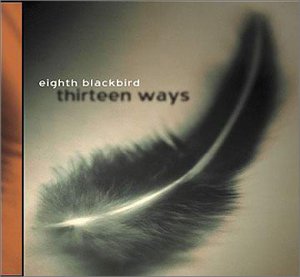
Thirteen Ways Composers: Tower, Perle, etc Performer(s): Eighth Blackbird You got to love a group that takes its name from one of Wallace Stevens' best poems but you'd love them if their name was Band X. This six-member ensemble mixes flutes, clarinets, violin and viola, cello, percussion and piano to create a big sound for chamber pieces. The composers here--Joan Tower, George Perle, David Schobar, and Thomas Albert--are all given polished and enthusiastic readings. Absolutely first-rate and highly recommended. |
 |
Search WWWSearch www.sequenza21.com |
